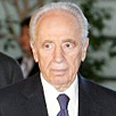
Hizbullah: Peres admitted defeat
Hizbullah spokesperson cites vice premier’s testimony before Winograd Commission as Israeli ‘admission of defeat’ in recent war in Lebanon. Peres’ office responds: Hizbullah twisting and distorting the facts as usual
In an interview with Lebanese newspaper the Daily Star, Hizbullah spokesman Hussein Rahal cited Vice Premier Shimon Peres’ recent testimony before the Winograd Commission as "an admission of defeat" in the recent war in Lebanon.
According to Rahal, Peres' statements were "a late admission of defeat by a man who thought that the war was a matter of life and death, and was one of the decision makers that began the war on Lebanon and the killing of the Lebanese people."
"They will learn that every additional attack on Lebanon will cost them. Everyone who was involved in decision making during the war will pay the price. (Prime Minister Ehud) Olmert will pay the price as well," added Rahal.
In response to Hizbullah's statements, Peres' office said Saturday that the organization was "twisting and distorting the facts as usual."
"Peres pointed out in his testimony that Hizbullah was hit hard and that over 650 of its fighters were killed in battle. In his testimony Peres was referring to the Israeli society's psychological state and not to the results of the war," Peres' office said.
'I wouldn't have gone to war'
In his testimony to the Winograd Commission, which was revealed on Thursday, Peres said that if it were up to him, Israel would not have gone to war in Lebanon last summer.
Peres was asked during his testimony about the recent war, as well as about two incidents which took place after the year 2000: Israel's withdrawal from Lebanon and the kidnapping of three IDF soldiers by Hizbullah.
Peres also said that he was not satisfied with the decision making before the war was launched, and the assumption that the IDF and the State were ready to handle such a war.
"I would not have come up with a list of goals for the war, because setting goals complicates things. If you say, for example, that the first goal is to release captives, you are in fact leaving yourself to the mercy of the enemy. Afterwards I also thought that the IDF was not prepared for this war," he said.
Asked what made him think that the IDF was not prepared for war, Peres said that "the IDF and any other army are built to fight another army. War on terror is similar to war on crime – you kill one criminal after another, but it's difficult to kill the crime.
"The next day another suicide bomber shows up, and it's even more difficult when there are a number of bombers. We also know that Lebanon is an uncontrolled land, filled with mines and organizations, and murder is a daily thing there."
The vice premier added that the war must not divide Israelis.
"On a personal note, I am glad that I don’t have to tell anyone 'I told you so.' I don’t think we were defeated in the war, but I think there was a very big psychological defeat, and the reason is that Hizbullah has a talented spokesman, (Hassan) Nasrallah, while here everyone constantly attacked each other."










